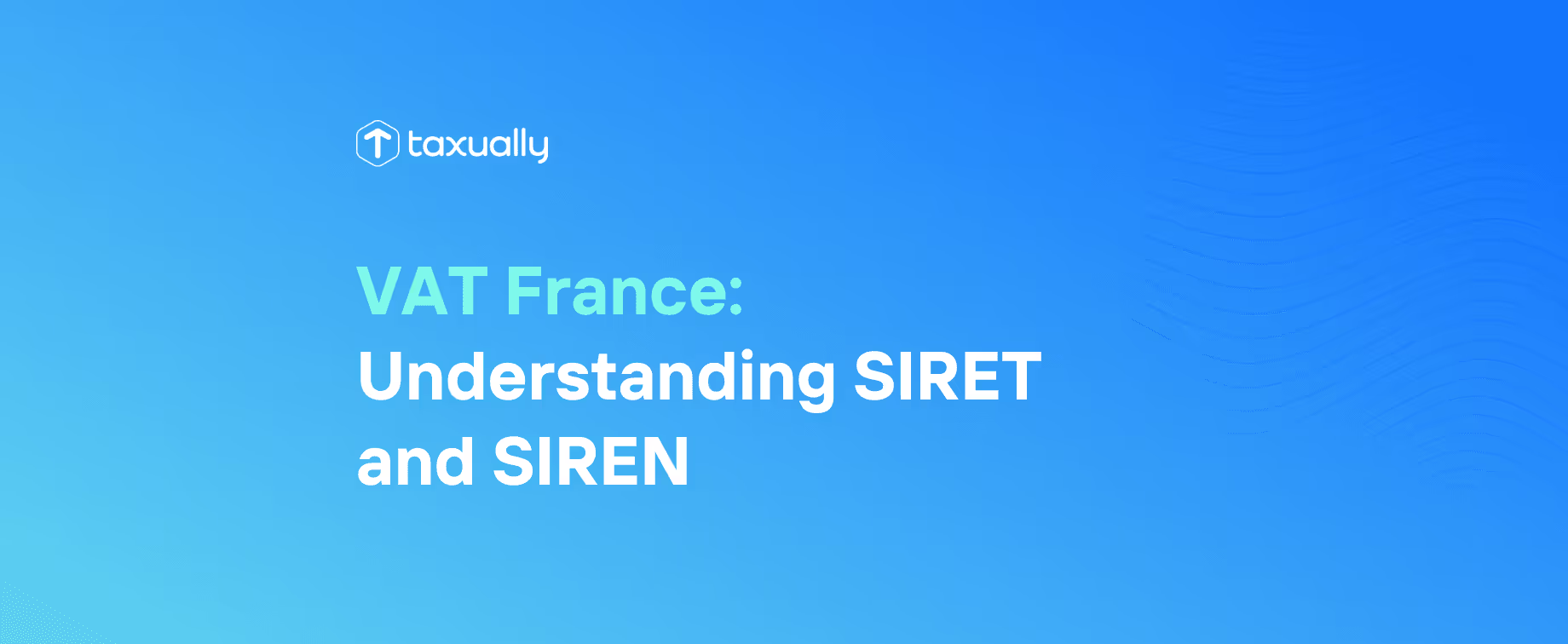Key takeaways
- SIREN and SIRET numbers are essential for identifying businesses in France—SIREN represents the business as a whole, while SIRET identifies individual establishments.
- Both numbers are mandatory for VAT registration and must be obtained before legally operating or invoicing in France.
- Having a SIRET and SIREN number enhances credibility, ensures compliance with French tax laws, and unlocks access to financial and administrative support.
If you run an ecommerce business and you’re planning to expand into the French market, understanding the complexities of VAT (Taxe sur la Valeur Ajoutée or TVA in France) is critical. Not only is VAT compliance a legal obligation, but it also directly impacts your profitability, customer experience, and overall operational efficiency.
One of the essential aspects of French VAT compliance is the SIREN and SIRET numbers, which are integral to the business registration process in France. This post will offer an in-depth look at these two key identification numbers, how they function, and their relevance to VAT obligations in France.

What are SIREN and SIRET numbers?
The SIREN and SIRET numbers are unique identification codes assigned to businesses and their various establishments by the French National Institute of Statistics and Economic Studies (INSEE). These numbers are essential for businesses operating in France, whether you’re a French company or a foreign entity that needs to register in the country for tax purposes.
While both numbers serve as identifiers, they serve different purposes and are used in various administrative and fiscal contexts. Here's a detailed explanation of each:
The SIREN number
The SIREN (Système d'Identification du Répertoire des Entreprises) number is a nine-digit identification code assigned to every registered business entity in France. It functions as the main registration number of the business and remains unchanged throughout the lifetime of the business, even if the business moves or undergoes a significant restructuring. The SIREN number is a key element in business-to-government interactions, particularly in the areas of regulatory compliance, financial reporting, and statistical tracking.
Structure of a SIREN number
A SIREN number comprises nine digits, and its format is entirely numeric. There are no other special characters or alphabetic components involved in the structure of a SIREN number. Its purpose is to serve as the primary identifier of the business, and it must appear on all official documents, such as invoices, contracts, and government filings.
Why Is the SIREN number important?
The SIREN number is essentially the "identity card" of the business within the French administrative system. This number is used in interactions with government authorities, such as the tax office, social security, and the labor inspectorate. Moreover, the SIREN number is crucial when filing your company’s annual financial statements or making modifications to your business structure.
It also serves an essential role in the broader European context. For example, if your business is involved in cross-border trade within the European Union (EU), the SIREN number will be used to register your business in the EU-wide VAT Information Exchange System (VIES), which is a central database that helps facilitate and monitor VAT transactions between businesses across member states.
The SIRET number
While the SIREN number identifies a company as a whole, the SIRET (Système d'Identification du Répertoire des Etablissements) number specifically identifies individual establishments or branches of the business. Every business can have multiple establishments, and each one will receive its own SIRET number, which is essentially an extension of the SIREN number but with added specificity.
Structure of a SIRET number
A SIRET number is composed of 14 digits in total. The first nine digits correspond to the company’s SIREN number, while the final five digits represent the NIC (Numéro Interne de Classement), which is a unique code that identifies the specific establishment or branch. This system ensures that each physical location or operational branch of a business is distinctly recognized within the administrative framework.
Why Is the SIRET number important?
The SIRET number is necessary for any dealings that involve a specific branch or location of a business. For example, when you file taxes, make social security declarations, or sign commercial contracts that pertain to a specific location, you will need to use the SIRET number.
In addition to these internal and administrative functions, the SIRET number also plays a role in making your business compliant with various French regulations regarding the display of business information. Just like the SIREN number, the SIRET number must be displayed on all formal business documents, including invoices, employment contracts, and tax filings.
VAT in France: the role of SIREN and SIRET numbers

When your business reaches a certain threshold for turnover in France—typically €10,000 if you're an ecommerce business selling to French customers—you must register for VAT in France. Once you register for VAT, the SIREN and SIRET numbers become vital elements in the compliance process.
The VAT registration process
The VAT registration process in France requires that you provide both your SIREN and SIRET numbers. These numbers form the foundation of your company’s legal and fiscal identity in France. After successfully registering for VAT, you will be assigned a VAT number (known as a TVA number in French), which is closely tied to your SIREN number. This VAT number is used on all invoices and official documents to ensure your compliance with tax regulations.
Why are SIREN and SIRET numbers important for VAT compliance?
One of the primary reasons SIREN and SIRET numbers are so critical to VAT registration is that they allow tax authorities to track and monitor businesses more effectively. The VAT number, linked to the SIREN number, enables the tax authorities to follow your business's VAT obligations and ensure you are fulfilling all of your tax duties.
For ecommerce businesses, this means that each sale you make to a French customer must include the appropriate VAT amount. Failing to display a valid VAT number on invoices or miscalculating VAT can lead to significant fines and penalties from French tax authorities.
Also, if your business engages in intra-community trade within the EU, your VAT number (derived from the SIREN) will be used in transactions with other businesses across EU member states. This ensures compliance with EU-wide VAT regulations and smoothens trade across borders.
How to obtain SIREN and SIRET numbers
If you are setting up a business in France, or if you are a foreign business that needs to register in France for VAT purposes, obtaining a SIREN and SIRET number is a necessary step. Registration for these numbers can be done online or in person at the appropriate Centre des Formalités des Entreprises (CFE), which is determined based on your specific business activity. The CFE will manage the registration process, and upon approval, you will receive your SIREN and SIRET numbers.
It’s also worth noting that you can check the validity of a company’s SIREN and SIRET numbers on the INSEE website. This is useful for verifying the legitimacy of business partners and suppliers in France.
The importance of VAT compliance in France
Expanding your ecommerce business into France presents significant opportunities, given the size and purchasing power of the French market. However, it also comes with its own set of regulatory requirements, particularly when it comes to VAT. Understanding the role of SIREN and SIRET numbers is fundamental to ensuring your business complies with French tax law.
By correctly registering for a SIREN and SIRET number, and by ensuring your VAT compliance, you will not only avoid potential penalties but also build trust with French customers and business partners. Proper compliance with French VAT regulations will also help you to streamline your administrative processes, allowing you to focus on growing your business in one of Europe’s most attractive markets.
Do you need help with your VAT compliance in France or elsewhere? Book a free call with one of our VAT experts to find bespoke solutions for your business, optimize your VAT costs, and reach millions of new potential customers.
Frequently asked questions
New Year's Day - 1/1/2024Memorial Day - 5/27/20244th of July - 7/4/2024Labor Day - 9/2/2024Thanksgiving Day - 11/28/2024Day after Thanksgiving - 11/29/2024Christmas Eve - 12/24/2024Christmas Day - 12/25/2024
What is the difference between a SIREN and a SIRET number?
The SIREN number identifies the entire business, while the SIRET number is specific to each establishment or branch of that business. The SIRET number includes the SIREN number plus an additional five digits to identify specific locations.
Why are SIREN and SIRET numbers important for VAT compliance in France?
These numbers are critical for VAT registration and compliance. The SIREN number is tied to your VAT number, enabling French tax authorities to track your VAT obligations, monitor transactions, and ensure compliance with tax laws.
How do I obtain a SIREN and SIRET number in France?
You can obtain these numbers by registering your business through the appropriate Centre des Formalités des Entreprises (CFE). Upon approval, you will receive both the SIREN and SIRET numbers necessary for tax and administrative purposes.
Do foreign ecommerce businesses need SIREN and SIRET numbers?
Yes, foreign businesses selling to French customers must register for VAT if they exceed the turnover threshold. As part of the VAT registration, obtaining SIREN and SIRET numbers is required.
Where can I verify the validity of a SIREN or SIRET number?
You can verify the validity of these numbers on the official INSEE (French National Institute of Statistics and Economic Studies) website, ensuring the legitimacy of business partners or suppliers.



















